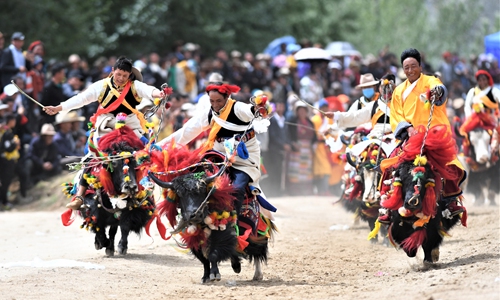HOME >> CHINA
Tibet government first in China to legislate ethnic unity guarantee
By Hu Yuwei Source:Global Times Published: 2020/1/12 20:48:40

Herdsmen take part in a yak competition to celebrate Ongkor Festival (Bumper Harvest) in Quxu County of Lhasa, capital city of southwest China's Tibet Autonomous Region, July 27, 2019. (Xinhua/Purbu Zhaxi)
The government of Southwest China's Tibet legislated to guarantee ethnic unity for the first time at the ongoing 3rd Session of the 11th People's Congress of Tibet on Saturday, reflecting the significant role of ethnic unity in the region's economic and social development, said experts.The law, which will take effect on May 1, makes it clear that Tibet has been an inalienable part of China since ancient times, and it is the common responsibility for the people of all ethnic groups to safeguard national reunification, strengthen ethnic unity and take a clear-cut stand against separatism.
The document stressed that Tibetan ethnic cultures are an integral part of Chinese culture, demanding all ethnic groups to protect, inherit and develop the traditional cultures such as Tibetan opera and thangka painting, local legislators suggested at the session.
According to the law, September is the publicity month for ethnic unity and progress in Tibet. Setting model area for ethnic unity is an innovative practice that different levels of government should adopt.
"This is the first legislation on ethnic unity at the autonomous region level across China," Penpa Lhamo, a deputy head of the Contemporary Studies Institute at the Tibet Academy of Social Sciences, told the Global Times on Sunday. "As far as I know, the legislation work started early last year, and it collected opinions from all aspects of the society."
A member of the Standing Committee of the Tibet Autonomous Region People's Congress said that under a series of central government's preferential policies, Tibet saw socialist ethnic relations featuring equality, unity, mutual assistance and harmony.
The legal move is to consolidate these practices and achievements in the form of local regulations.
"The legislation considers local ethnic characteristics of Tibet. Ethnic unity is an important goal of stable social governance in the region. The move is also in line with the Constitution's provisions on ethnic unity," Penpa Lhamo said.
There are more than 40 ethnic minorities account for 95 percent of Tibet's 3 million population, the Xinhua News Agency reported in September 2019.
Posted in: SOCIETY,CHINA FOCUS